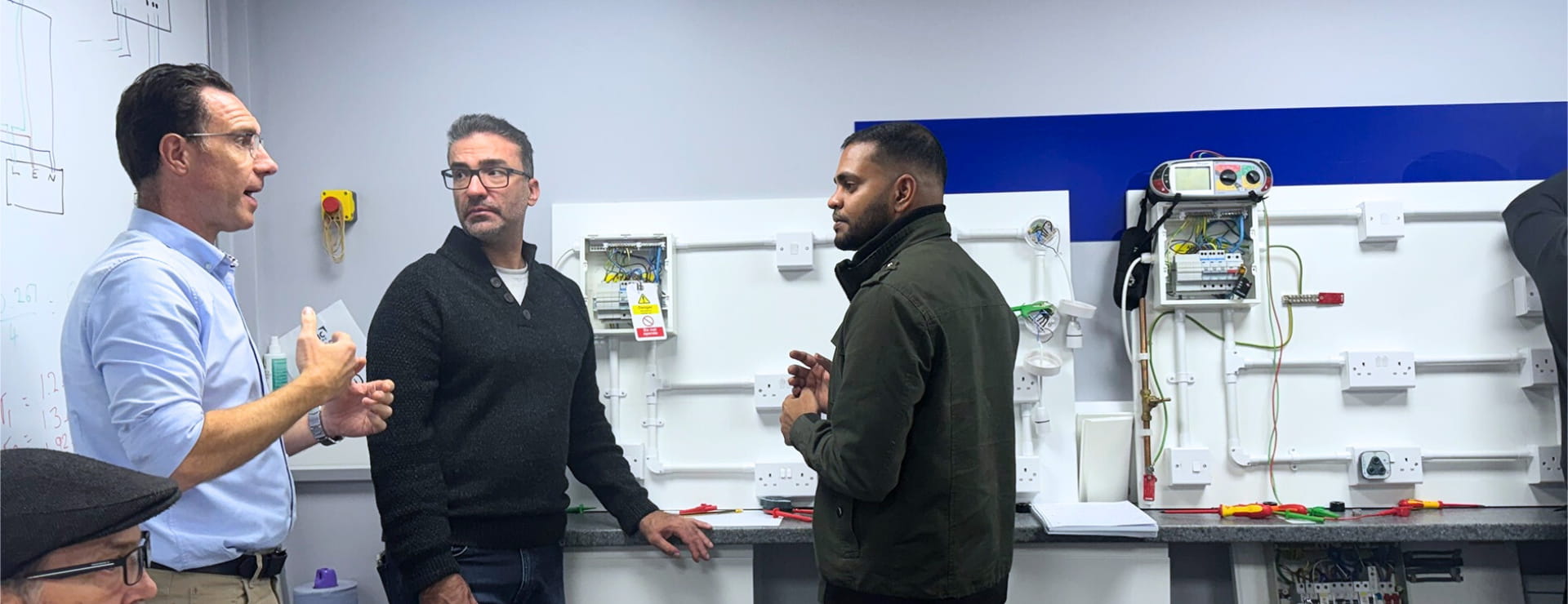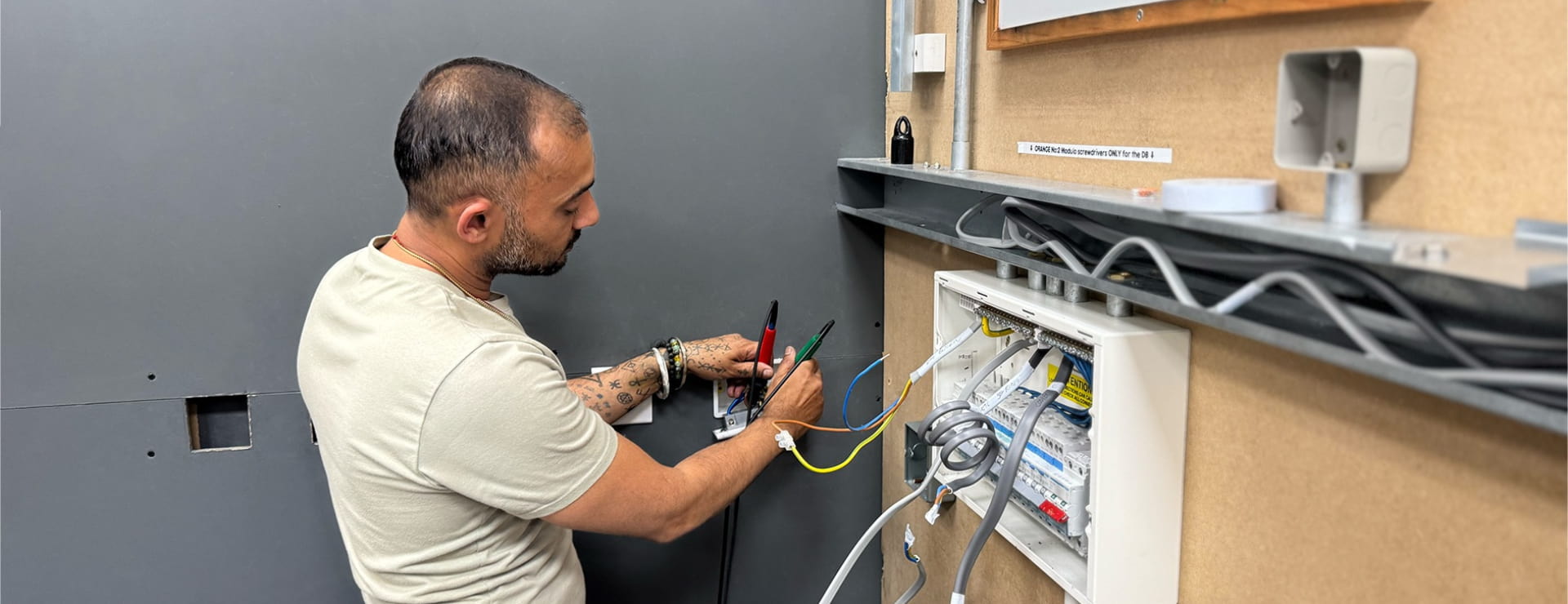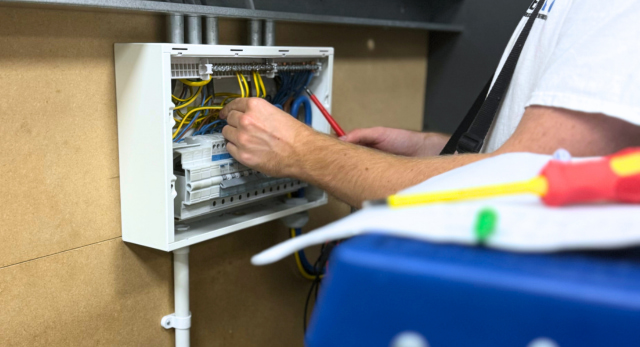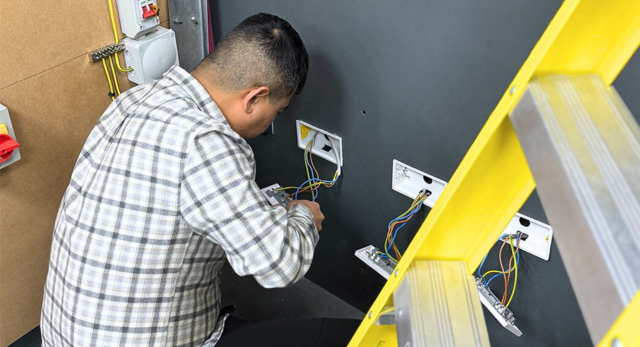Becoming an electrician in the UK can take anywhere from a few weeks to several years, depending on the route you choose and the level you want to reach. In broad terms, domestic installer/fast‑track courses can have you working in as little as 4-12 weeks (plus 6-18 months building experience), Diploma & NVQ routes usually take around 1-3.5 years, full apprenticeships typically take 2-4 years, and Experienced Worker Assessment routes for time‑served electricians take a minimum of 6 months. This guide breaks down each pathway, explains the key qualifications and assessments, and shows how Logic4training’s in‑centre electrical courses can help you pick the right option for your timescales, budget and long‑term career goals.

The time it takes to become an electrician depends mainly on three things: the route you choose, your prior experience, and how quickly you can build a portfolio of real work. Fast‑track domestic installer training can be completed in as little as 4-12 weeks, while more comprehensive routes, such as the electrical Diplomas and NVQ route or an electrical apprenticeship path, usually take 1-4 years.
Typical timelines in 2026 look like this:
- Diploma & NVQ Level 3 route: usually 1-3.5 years, depending on how quickly you learn and gather on‑site evidence.
- Full Level 3 electrical apprenticeship: typically 2-4 years to reach fully qualified status.
- Experienced Worker Assessment (EWA): minimum 6 months, provided you already have 3-5 years’ experience and the right foundations.
- New Entrant Domestic Electrical Installer / fast‑track domestic route: 4-12 weeks for training, then 1–2 years to build experience and progress.
Whichever option you choose, Logic4training provides structured, in‑person training, clear progression routes and support towards the qualifications you need to work safely, legally and confidently in the UK.
Diploma & NVQ (becoming a fully qualified electrician)
If you want to become a fully qualified electrician able to work across domestic, commercial and industrial environments with an ECS Gold Card, the Diploma and NVQ route is often the best fit. The time to become an electrician this way ranges from roughly 10 months to as long as 3 and a half years. It all depends on the training options you choose (full-time, part-time, college, training provider) and how long it takes you to complete the Level 3 Electrical NVQ portfolio element.
This pathway typically looks like this.
- City & Guilds 2365 Level 2 Diplomas in Electrical Installations: Entry-level classroom and workshop‑based training in electrical principles, installation techniques, and safety.
- City & Guilds 2365 Level 3 Diplomas in Electrical Installations: Builds upon the Level 2 Diploma by learning about advanced electrical theories and practical skills.
- City & Guilds 2357 Level 3 NVQ Diploma in Electrical Installation and Maintenance: This is a work‑based qualification where you gather real‑world evidence on site to show occupational competency.
- AM2 Assessment: This is the final unit of the Level 3 NVQ and the final practical assessment of your competence.
Timings
- City & Guilds 2365 Level 2 Diplomas in Electrical Installations:
- With a training provider: 7 weeks
- At college: 10 weeks to 1 year (full-time/part-time)
- City & Guilds 2365 Level 3 Diplomas in Electrical Installations:
- With a training provider: 7 weeks
- At college: 24 weeks to 1 year (full-time/part-time)
- City & Guilds 2357 Level 3 NVQ Diploma in Electrical Installation and Maintenance:
- As this is predominantly a portfolio-based qualification, the time it takes to complete is dependent on the learner, but it is typically completed in 6-18 months.
- AM2 Assessment: This is the final unit of the Level 3 NVQ and the final practical assessment of your competence.
- The AM2 is a 3-day assessment.
Why choose the Diploma & NVQ route?
This route is ideal if you:
- Want the broadest possible range of job opportunities, including commercial and industrial.
- Prefer a structured, classroom‑plus‑site learning approach.
- Are aiming for an ECS Installation or Maintenance Electrician Gold Card and long‑term career progression.
Logic4training’s tutors are time‑served electricians and assessors who support you through both the technical content and the practical evidence‑gathering process, helping you reach NVQ portfolio completion and AM2 with confidence.
Full Electrical Apprenticeship
An electrical apprenticeship remains the classic route into the trade, especially if you are starting out in your late teens or early twenties. Apprentices typically split their time between a real‑world employer and structured college or training centre learning.
How long does an apprenticeship take?
Most Level 3 Electrical Apprenticeships take between 2 and 4 years, depending on your employer, training provider and how the programme is structured.
During this time, you will work towards:
- A Level 3 Diploma / NVQ‑type qualification in Electrotechnical Systems or Electrical Maintenance.
- 18th Edition Wiring Regulations.
- AM2 / AM2S as a final end‑point assessment.
Apprenticeships are particularly well‑suited to school leavers who want to earn while they learn, build experience slowly over time, and embed themselves in a company’s culture and systems.
While Logic4training focuses strongly on new‑entrant and adult training, our team regularly speaks to learners about whether an apprenticeship, fast‑track course or Diploma & NVQ route is the best fit and can help you understand the pros and cons of each before you commit.
Why choose the electrical apprenticeship route?
This route is ideal if you:
- Want to earn while you learn, with a wage coming in while you work towards a recognised Level 3 electrical qualification over 2-4 years.
- Prefer to be employed from day one, gaining day‑to‑day site experience alongside scheduled college or block‑release training.
- Like the idea of learning directly from experienced electricians on live jobs, building real confidence with tools, materials and customers.
- Are starting your career straight from school or college and want a clear, employer‑backed route into the trade.
- Want strong long‑term prospects, as apprenticeships are widely recognised by employers and align with the requirements for ECS Gold Cards and higher‑level progression.
Logic4training supports future apprentices with clear guidance on how apprenticeships fit alongside other routes, links to resources such as our free Ultimate Guide to Electrician Careers, and practical advice on finding and securing apprenticeship positions with reputable employers.
Experienced Worker Assessment (EWA) Route
If you have already been working in the industry but never completed a full Level 3 qualification, an Experienced Worker Assessment (EWA) is often the most efficient way to formalise your skills and secure an ECS Gold Card.
Who is the EWA for?
EWA routes are designed for:
- Electricians with at least 3 years’ experience who want a Domestic Electrician Gold Card (domestic EWA).
- Electricians with 5 or more years’ experience looking for an Installation or Maintenance Electrician Gold Card.
- To be accepted, you must be able to prove a significant amount of on‑site work and usually hold at least a Level 2 electrical qualification or equivalent.
How long does the EWA take?
Both the Domestic Electrician EWA and the Installation/Maintenance EWA take a minimum of 6 months, assuming you can supply enough varied evidence and complete the required portfolio tasks. You will also need to pass an AM2E(D) or similar assessment at the end of the process.
Later in 2026, Logic4training will support domestic installers and improvers through Experienced Worker Qualification routes that reflect the latest EAS and CPS requirements, helping them transition from “time‑served but unqualified” to fully recognised status.
Domestic Installer/Fast‑Track Route
If you want to get working in domestic properties as quickly as possible, the domestic installer route is often the most appealing. It is popular with adult career changers and existing trades (for example, gas, plumbing or construction) who want to add electrical work to what they already do.
How long does this route take?
A typical foundation‑level domestic installer programme can be completed in around four to six weeks of intensive, centre‑based training. Many providers structure this as a combined “new entrant” package delivered over several modules, often adding up to roughly 25-30 days of learning. After this initial training, most new domestic installers will then spend around 6-18 months consolidating their skills on site, building a portfolio of real work and, if they wish, working towards further qualifications or Competent Person Scheme (CPS) registration.
A solid domestic installer package will normally include:
- Part P Domestic Electrical Installer qualification.
- 18th Edition Wiring Regulations (BS 7671).
- Initial Verification, Testing and Certification of Electrical Installations.
These are the core qualifications that allow you to carry out a wide range of domestic electrical work safely and in line with current regulations.
Progression, CPS changes and 2026 rules
If you plan to sign off your own work (rather than working under another electrician), you will usually aim to join a Competent Person Scheme as a Qualified Supervisor. Historically, you could complete a Level 3 Certificate in Installing, Testing & Ensuring Compliance of Electrical Installations in Dwellings and then apply to join a CPS on that basis.
However, there is a key change for 2026: the EAS committee has removed this as a direct entry route into Part P CPS schemes from 1 January 2026. To join a CPS using that specific Level 3 dwelling‑based qualification, you must have completed the course, on‑site portfolio and certification by 31 December 2025.
From mid to late 2026 onwards, the same qualification becomes part of the Experienced Worker Qualification (EWQ) pathway instead. This allows you to gain a Level 3 Domestic Electrotechnical Qualification, apply for a Domestic Electrician Gold Card, and then join a CPS, subject to completing a portfolio and an AM2 assessment.
Which Route Is Right For You?
To help you choose, here is a quick comparison of the main routes discussed above.
| Route | Typical duration | Best for | Main outcome / goal | Good to know |
|---|---|---|---|---|
| Diploma & NVQ (2365 + 2357) | Around 2–3 years in total, including NVQ portfolio and AM2 | Those aiming to be fully qualified across domestic and commercial environments | ECS Installation or Maintenance Electrician Gold Card after AM2, with broad employment options | More classroom and portfolio work than a domestic route, but leads to the widest range of roles |
| Full apprenticeship | Typically 2–4 years, combining work and study | School leavers or anyone who wants to earn while they learn with a long‑term employer | Fully qualified electrician status with strong on‑site experience and clear progression options | You need an employer to sponsor the apprenticeship and commit to the full programme length |
| Experienced Worker Assessment (EWA) | Minimum 6 months, depending on how quickly you evidence your experience | Time‑served electricians without a full Level 3 qualification who need formal recognition | Domestic / Installation / Maintenance Electrician Gold Card after completing the EWQ and AM2E(D) | You must prove 3–5+ years’ experience and hold suitable underlying qualifications to be accepted |
| Domestic installer / fast‑track | 4–12 weeks of training, then 1–2 years building experience on site | Adult career changers and multi‑skilled trades working mainly in homes | Work as a domestic installer with the option to progress to Experienced Worker routes and a Domestic Electrician Gold Card | Fast to start earning, but initially focused on domestic work only; further study needed for wider scope or CPS / Gold Card status |
Once you have chosen your main training route and understand roughly how long it will take to reach qualified status, the next question is how you keep your skills sharp and your earning potential growing. Upskilling into areas like EV charging, solar PV, battery storage, inspection and testing or PAT testing does not usually mean starting from scratch again. Instead, these are short, focused courses that fit around work and build on your core qualifications.
In the next section, we look at how long these add‑on courses typically take and how Logic4training structures them so you can move quickly into high‑demand, higher‑value work.

Electrical Upskilling & Specialist Electrical Training
Electrical upskilling and specialist courses are a fast way for qualified electricians to increase their earning potential and stay relevant in a changing market, without committing to another multi‑year qualification. In most cases, you can add a new skill, such as EV charging installation, solar PV, battery storage or PAT testing, in a matter of days rather than months, which fits neatly around full‑time work.
How long do electrical upskilling courses take?
While each provider is different, most specialist electrical courses are designed as short, intensive programmes that you can complete in under a week. Logic4training structures these as focused 1-3 day blocks that blend classroom learning with hands‑on practical work, so you can upskill quickly while still gaining meaningful experience on real‑world rigs and equipment.
Typical durations for common upskilling routes in 2026:
PAT Testing (Portable Appliance Testing)
PAT Testing is one of the quickest electrical add‑ons to complete.
- Most in‑centre PAT Testing courses for electricians and facilities staff run over 1 day, sometimes 2 days if combined with extra practical or wider electrical safety content.
- Our City & Guilds 2377 PAT Testing course is delivered as a short, intensive programme, with training and assessment completed within a single day at the centre.
There are also online PAT refreshers that take around 25-60 minutes, but these are best seen as awareness or CPD, not a substitute for a recognised, in‑person qualification.
Initial Inspection & Testing
Initial inspection and testing is the first step in the inspection and testing journey, focused on verifying new installations before they are handed over to the customer. It is aimed at experienced electricians who are responsible for signing off new work to BS 7671 and completing Electrical Installation Certificates.
- Our Level 3 Initial Inspection & Testing (RQF) course is delivered over 4 days, with training and assessment completed during the same block.
- The programme covers Electricity at Work Regulations, BS 7671 and Guidance Note 3, the initial verification process, inspection techniques, practical testing and completion of Electrical Installation Certificates.
Assessment is via practical tasks plus short written/open‑book exams, so you leave with a recognised Level 3 qualification rather than just a certificate of attendance.
Periodic Inspection & Electrical Testing
Periodic inspection and testing is a step up, focused on the condition reporting of existing installations rather than new work. It is designed for electricians who carry out EICRs in domestic, commercial and industrial settings and who need to code defects, report on condition and advise clients.
- Our Level 3 Periodic Inspection, Testing, Condition Reporting & Certification course is delivered over 3 days as an intensive, in‑centre block.
- The course covers Electricity at Work Regulations, BS 7671 and Guidance Note 3, the full periodic inspection and testing process, practical inspection and testing, understanding Condition Report codes and completion of EICRs.
Like the initial course, assessment is via a practical exam and two short written/open‑book papers, and the qualification is recognised by JIB, ECS and Competent Person Schemes such as NICEIC and NAPIT.
EV Charging Point Installation
EV charging qualifications are typically short, focused courses for experienced electricians.
- Logic4training’s Electric Vehicle (EV) Charging Point Installation course runs over 2 days, with training and assessment delivered in‑centre.
- Similar EV charging qualifications from other providers are typically 1-2 days long and build on your existing knowledge of wiring regulations and initial verification.
The EV charging course sits within our wider renewables course offerings, making it easy to add battery storage training afterwards if you wish.
Solar PV installation
Solar PV training is slightly longer, as it must cover system design, roof‑mounted installation and working on “live” PV equipment.
- Our Level 3 Qualification in the Installation & Maintenance of Small Scale Solar Photovoltaic Systems is typically delivered over 3 days.
- The course is structured as a mix of classroom sessions and practical work on purpose‑built rigs with roof mounting kits and operational PV equipment.
Many training providers offer a combined solar PV and battery packages on the market are 3-5 days long, which matches our approach of giving you enough time to gain hands‑on experience rather than just theory.
More information is available on the Solar PV & Battery Storage Training Course Package page.
Battery storage / Electrical Energy Storage Systems (EESS)
Battery storage and energy storage courses are usually designed as a short add‑on to solar PV training.
- Our LCL Awards Level 3 Qualification in the Design, Installation & Commissioning of Electrical Energy Storage Systems runs over 2 days.
- Taken with solar PV, this gives you a 5‑day package covering both technologies, often delivered back‑to‑back in the same week.
Other providers offer similar 2-4 day battery storage courses for qualified electricians, so you can realistically move from zero battery experience to certified installer in less than a week of focused training.

Course structure: Why You Should Avoid Online Training
Over the past 5 years or so, more and more trade training providers have started to offer online training. One theme that runs strongly through our approach to electrical training (and other trades) is a focus on in‑person training led by experienced tutors, backed up with online revision tools rather than the other way around.
Whilst online training sounds like a great idea, and is marketed as a way that you can “learn at your own pace” or train with a “blended” approach, Online training can significantly affect the amount of time it takes to become an electrician (or other tradesperson). In reality, spreading core learning across online modules often slows progress, whereas focused, in‑centre training with structured timetables, clear learning criteria and immediate tutor feedback helps you build competence and reach qualification more quickly and reliably.
Practical workshops
Hands‑on workshops are at the heart of every Logic4training electrical course. In these sessions you:
- Work on realistic training rigs and simulations of domestic and commercial installations.
- Practise terminating cables, installing circuits, testing and certifying your work.
- Learn to use test instruments correctly under supervision.
This sort of structured practice is essential for developing the muscle memory and attention to detail that good electricians need.
Classroom and guided theory
Alongside practical work, you attend classroom sessions on topics such as wiring regulations, design, and safety. These are delivered by trainers who have worked in the field for many years and can translate complex regulations into clear, real‑world examples.
Revision platforms such as Logic4training’s own ClubLogic are used to reinforce learning rather than replace it. They are ideal for revising the 18th Edition or refreshing theory at home but are not treated as a substitute for face‑to‑face teaching.
Why to be wary of online trades training
Logic4training consistently advises candidates to avoid electrical training that is delivered purely online. While online study looks flexible and cheaper, it cannot replicate supervised practical work, real‑time feedback or the chance to ask questions and watch demonstrations up close.
In short: If you want to besafe, employable and compliant, invest in a provider that offers proper workshop time, qualified tutors and robust assessment, not just a video series and an exam.
For a deeper dive into this topic, it is worth reading our page on online learning versus in‑person training in the trades, as well as the broader how to become an electrician article.
Benefits of Professional Electrical Training
It is technically possible to carry out some very basic electrical work in the UK without formal qualifications, but anyone wishing to operate professionally or sign off their own work must hold industry-recognised qualifications such as NVQ Level 3 or equivalent. We strongly advise all aspiring electricians to complete a structured training programme to learn the theoretical and practical skills essential for safety, quality, and compliance. Professional qualifications not only give you the expertise needed to excel in a growing and competitive trade, but they also build trust with clients and open up opportunities, from domestic to commercial and specialist roles.
Career advancement opportunities
One of the standout advantages of electrical training is the wealth of career opportunities it unlocks. With a formal qualification, you can move from foundation roles all the way up to supervisory positions, specialist installation work, project management, or even starting your own business. Employers and clients consistently prefer electricians who have completed accredited training, valuing the proven expertise and real-world experience that such pathways provide.
Financial considerations and ROI
Although becoming a fully qualified electrician requires an investment of both time and money, the long-term rewards are substantial. Trained electricians command significantly higher salaries and rates than unqualified counterparts and benefit from better job security, especially as demand in the UK continues to outstrip supply. The average salary for a newly qualified electrician sits around £30,000-£32,000, while experienced electricians can earn £40,000-£52,000, and those who specialise or run their own businesses regularly achieve £60,000 or more. For a deeper breakdown of earning potential and day rates, see our survey: Electrician Day Rates in the UK. With the ongoing shortage of skilled electricians, strong earnings and stable employment are a reality for those investing in professional training.
Getting Started: The Next Steps
If you are ready to move forward, a simple plan looks like this.
1. Decide your end goal
Do you want to focus on domestic work, or are you aiming for full scope and commercial/industrial jobs?
2. Choose your route
- Diploma & NVQ (2365 + 2357).
- Apprenticeship (if appropriate).
- Experienced Worker Assessment, if you are already on the tools.
- or Domestic installer
3. Research training providers
It’s always best to look around and see what the pros and cons are for each training provider.
If you want to find out more on Logic4training, we have linked the relevant pages here:
Our Trustpilot page
Our Google Reviews: Northolt | Luton | Basildon | Sittingbourne
Our new entrant/beginner electrical route
Fast-track electrician courses: Shortcut or setback?
4. Talk to the team
Once you have had a look around, you will need to call the training providers and speak to their teams. When speaking to them about the electrical training:
- See if the training is done in-person, ‘blended’ or online.
- Get a feel for the environment you’ll be training in (some training providers to open days).
- Gain and full understanding of the training route/course you’ll be completing.
- And finally how much the route/course will cost
If you want to speak to our team, you can call us on 020 8845 7222 (you can click the get in touch button at the top of the screen). We’d be happy to help you find the right course!
5. Book your course and commit
Once you have chosen the route, commit to the learning, practical work and portfolio building needed. The effort you invest over the next few months or years will shape your career for decades.
Conclusion: How Long It Really Takes & What Affects It
The honest answer to “how long does it take to become an electrician?” is that it depends on the route you choose, how much time you can commit, and how quickly you build on‑site experience and portfolio evidence. Apprenticeships typically take 2-4 years, Diploma & NVQ routes usually sit in the 1-3.5 year range, Experienced Worker Assessment routes take a minimum of 6 months, and domestic installer programmes can have you working in as little as 4-12 weeks plus 6-18 months of real‑world experience.
Several key factors influence how long your electrical training will take in practice:
- Training route: Apprenticeships and full Diploma & NVQ programmes take longer but lead to broader “fully qualified” status; fast‑track domestic routes are quicker but narrower in scope, with further study needed later.
- Learning method: Full‑time, in‑centre training is usually faster than part‑time college or stop‑start online learning, which can stretch programmes over extra months or years.
- Existing experience and qualifications: Time‑served electricians can shorten the journey via Experienced Worker Assessment if they already have 3-5+ years on the tools and at least a Level 2 qualification.
- Portfolio and assessment speed: NVQ and EWA timescales are driven by how quickly you gather varied on‑site evidence and are ready for assessments such as AM2 or AM2E(D).
- Training quality and delivery style: Structured, workshop‑led training with clear milestones tends to get you competent and qualified more efficiently than disjointed or purely online options.
If you want to move quickly and safely, the most important decision you make is who you train with. Logic4training delivers recognised City & Guilds and LCL Awards qualifications, in‑person electrical courses and specialist upskilling in areas like EV charging, solar PV, battery storage, inspection and testing and PAT. All are designed around realistic timelines and real‑world outcomes. Whether you are just starting out, changing career or formalising years of experience, our team can help you map out a route that fits your starting point, preferred timescale and long‑term goals.
FAQs
How long does it take to become a fully qualified electrician in the UK?
The time it takes to become a fully qualified electrician depends on the route you choose and your starting point. A domestic installer/fast‑track route can have you working in as little as 4-12 weeks, with a further 6-18 months of on‑site experience and progression. A Diploma & NVQ route typically takes around 2-3 years, while a full Level 3 electrical apprenticeship usually takes 2–4 years. Experienced Worker Assessment (EWA) routes for time‑served electricians take a minimum of 6 months, assuming you already have 3–5 years’ experience and can complete your portfolio and AM2E(D) assessment.
What affects how long my electrician training will take?
Several factors influence training duration: your chosen pathway (apprenticeship, Diploma & NVQ, domestic installer or EWA), whether you study full‑time or part‑time, how quickly you can build a portfolio of on‑site evidence, and any prior experience or qualifications you already hold. Purely online or very “stop‑start” learning can slow you down, while structured, in‑person training with clear milestones tends to get you competent and qualified more efficiently.
Do I need an apprenticeship, or can I become an electrician through courses instead?
You do not have to complete an apprenticeship to work as an electrician. Many adults and career changers use intensive training routes such as new entrant domestic installer courses or Diploma & NVQ programmes delivered by specialist training providers, then build experience and complete NVQ or EWA pathways to reach Gold Card level. Apprenticeships remain an excellent “earn while you learn” option, but they are not the only way into the trade.
What qualifications do I need to sign off my own electrical work?
To work professionally and sign off your own work, you will usually need a Level 3 electrical qualification (such as an NVQ Level 3 or equivalent), 18th Edition Wiring Regulations, and appropriate inspection and testing qualifications, alongside meeting the requirements of a Competent Person Scheme or ECS Gold Card. Specialist services such as PAT testing, EV charging or solar PV and battery storage require additional accredited courses, which are typically 1-5 days each.
Is Logic4training a good place to train as an electrician?
Logic4training is an established provider of electrical, gas and renewables training, delivering City & Guilds and LCL Awards qualifications for both new entrants and experienced electricians. The company focuses on in‑centre, workshop‑led training, offers clear routes from beginner to NVQ and EWA, and has strong independent reviews on platforms such as Trustpilot. If you are considering training, it is worth exploring Logic4training’s
electrical courses, reading related insights such as How Long Does it Take to Become an Electrician? and Retrain as an Electrician in 2026, and speak to the team for tailored advice.


